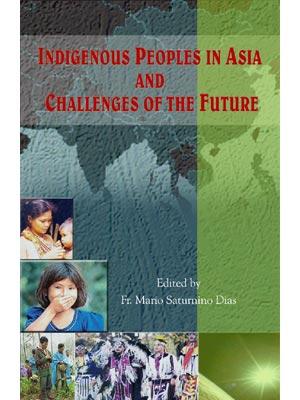
INDIAN TRIBES AND THE MAINSTREAM
Edited by Sukant K. Chaudhury and Soumendra Mohan Patnaik
The volume posits a critique to the prevalent dichotomy between the mainstream of Indian society and the tribal cultures. Here, an attempt has been made to explore why this dichotomy came into existence and what have been its consequences in the socio-political reality of the nation. Drawing from both micro and macro studies the authors question the utility of traditional anthropological discourses on tribal societies. An endeavour to move beyond the straightjacketed approach helps in understanding the nuances and fluidities of cultural boundaries. It also enables us to see tribals as both victims and instruments in the social and political processes of nation-building. Further, the volume examines the structure and processes of the tribal society vis-à-vis their problems, policies, transformation, ethnic discourse and the future. It will be of interest to planners, researchers and students from both a theoretical perspective and empirical understanding.

INDIGENOUS PEOPLES IN ASIA AND CHALLENGES OF THE FUTURE
Fr Mario Saturnino Dias (General Editor)
This volume touched upon various important aspects of the sad plight of the Indigenous/Tribal Peoples and proposed possible course of action by the Church to serve them best and to bring them the Good News of liberation.

LEGACY OF AMBEDKAR: Analysis and Appraisal
Edited by Lancy Lobo and Dhananjay Kumar
This collection of essays examines the legacy of Dr. B.R. Ambedkar with regard to his ideas of social democracy, eradication of caste system, formation and strengthening of constitutional institutions, and the role of religion and caste in a democracy. This volume is not a eulogy for Ambedkar, but an analytical attempt to look at his contributions and failures. The primary objective of the volume is to assess Ambedkar from a detached, unbiased and objective view in the light of changing contemporary India.

RELEVANCE OF AMBEDKARISM IN INDIA (Second Edition)
Edited by K S Chalam
Ambedkarism as an ideology of the oppressed in India, particularly with reference to Bahujan masses, has emerged as a dominant discourse. It was during the centenary year 1991 that academics and activists discussed the contributions of B.R. Ambedkar in detail and realised the potential of a liberation thought. The book being an outcome of a national seminar for the first time twenty-five years ago, established theoretical foundations of building Ambedkarism as a philosophy. There are four sections containing 26 papers. Justice V.R. Krishna Iyer, A.M. Rajasekhariah, Sharad Patil, S.G. Kulkarni, S.K. Sarkar, K.N. Kadam and others; along with K.S. Chalam deliberated at the seminar around the theme of the book. This edition of the book contains new material that recorded the immensity and exuberance of Ambedkarism during the last twenty-five years since the first edition appeared.

RESOURCES, TRIBES AND DEVELOPMENT: Competing Interests and Contours of Possibilities
Editors: M.C. Behera and Jumyir Basar
The papers included in this volume primarily focus on contradicting perspectives, competing interests and emerging outcomes when the relation between tribes and their resource perceptions shifts along the line of corporate-induced development projects. Precisely, it is a compendium of issues related to development induced displacement. With distinct analytical frames and empirical findings, the papers, contributed by the experts in the field – academics, bureaucrats and activists alike – unambiguously present a critique to perspectives of people’s development within the frame of contemporary development discourse.

SOCIAL INEQUALITY IN INDIA: Profiles of Caste, Class & Social Mobility (Second Edition)
Edited by K.L. Sharma
Since independence restructuring of Indian society has been an active agenda on the policies and programmes of the Indian State and various movements launched by several organisations and groups of people. Such a restructuring is being sought by transformation of the inegalitarian traditional social order into a more egalitarian system of social relations. The focus in this volume is on the study of theory, structure and process relating to hierarchy and social inequality.

TRIBAL ECONOMY AT CROSSROADS
Edited by S.N. Chaudhary
This book deals with nature and dynamics of tribal economy in India. It also discusses functional and dysfunctional implications of the changing patterns of tribal economy on physical and social quality of life of the tribal masses. Tribal economy, in relation to institutional intervention, civil society initiatives and other macro-micro factors, has been examined in a thorough manner. Some of the articles have also underlined priority areas of teaching and research on tribal issues. Besides, it also suggests blueprint for comprehensive and sustainable development of tribal economy in an era of globalization when interactions between tribal economy and outside forces have massively increased.
Besides the students of Sociology, Social Anthropology and Social Work, the book will be quite useful for planners, policy makers, NGOs, PRIs and all the chaange agents who are directly or indirectly associated with the question of tribal development.

TRIBAL HEALTH AND NUTRITION
Edited by S.N. Chaudhary
Health and nutrition are two interrelated issues which have drawn the attention of scholars across the world. This book, which is the outcome of a national seminar, examines different issues relating to tribal health and nutrition in India in specific context of their culture, local ecology, voluntary efforts and institutional intervention. The broad conclusion of most of the papers included in this volume highlights pitiable conditions in this regard. Scholars have however suggested ways and means to deal with inhibiting factors responsible for slow and lop-sided process of improvement in health and nutritional status of tribes. Also, some fruitful suggestions have been made in several articles. Altogether this book is a valuable contribution to the field of tribal health and nutrition. Its study would profit both the students and researchers of Sociology, Social Anthropology and Social Work.

















